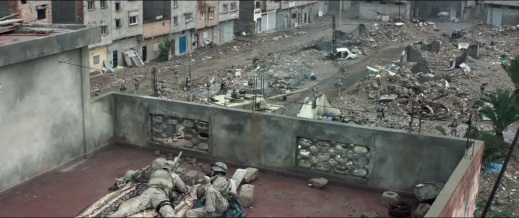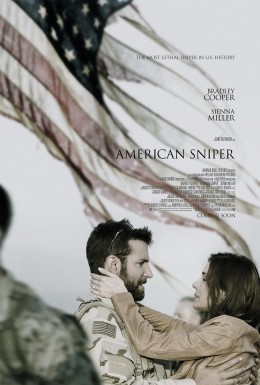Directed by: Clint Eastwood || Produced by: Clint Eastwood, Robert Lorenz, Andrew Lazar, Bradley Cooper, Peter Morgan
Screenplay by: Jason Hall || Starring: Bradley Cooper, Sienna Miller, Max Charles, Luke Grimes, Kyle Gallner, Sam Jaeger, Jake McDorman, Cory Hardrict
Music by: Joseph DeBeasi, Clint Eastwood || Cinematography: Joel Cox || Edited by: Gary D. Roach || Country: United States || Language: English
Running Time: 132 minutes
Truth be told, I’m impressed but not as surprised as everybody else in the critical and cinephile-sphere at American Sniper’s success, given my background. I was born and raised in moderately conservative rural Illinois, where long stretches of corn and soybean fields stretch well past the horizon and then some, where people most always vote Republican, the government is viewed with mistrust, and poor people receiving welfare “handouts” is worthy of a sneer. Respect for the military and American patriotism is overtly displayed there in both good ways and bad. As such, I was none too surprised when I went to my local theatre on Thursday night to see a packed house near my town of 12,000.

Bradley Cooper (bottom left) surveys an Iraqi warzone recreated in magnificent detail for the film’s first sniper mission.
For my part, I thought Clint Eastwood’s Sniper was a tense, well directed, well written, and reasonably edited war picture that took ample but efficient time to establish a captivating portrait of the American campaign in Iraq. Like similar effective dramatizations of contemporary Middle East conflicts before it (e.g. The Hurt Locker [2009], Generation Kill [2008], Zero Dark Thirty [2012]), Sniper avoids an obvious political stance on the nature of modern war and America’s place in it.
Given the film’s rampant financial success, its title, its setting, and its autobiographical subject matter, American Sniper has prompted controversy. Numerous left-leaning critics, including many professional movie reviewers, have lambasted the film as American propaganda or glorifying a supposed bloodthirsty, psychopathic “patriot” or even compared it to the Nazi sniper film-within-a-film from Inglorious Basterds (2009), “Nation’s Pride.”
Aside from numerous people’s immature inability to separate warfare itself from the warrior (or the grunts fighting and bleeding on the frontlines as opposed to the fascist fucks who sent them there in the first place), the film itself is ambiguous in its assessment of its controversial subject matter, the most lethal sniper in US history, Chief Petty Officer (and Navy SEAL) Chris Kyle. While Kyle himself is portrayed as close-minded, crude, and quite conservative in that most proud Texan sort of way, he is also painted as emotionally conflicted, a loving father and husband, a masterful soldier and marksman, and clearly suffering from post-traumatic stress disorder (PTSD). On the one hand, he is an ordinary, compassionate citizen who wants to serve his country and protect his comrades-in-arms, and on the other, his daily job is to shoot down enemy combatants from afar, including any and all threats to the questionable American invasion of Iraq, be they men, women, or children.
The film asks the disturbing question: How does one deal with being considered a “Legend” (as his fellow Americans call him) or “The Devil of Ramadi” (as the Iraqi insurgents referred to him)? How does one comprehend and come to grips with being a masterful artist when one’s artistry is taking away life? Kyle’s arc as depicted in the film is simultaneously disturbing, tragic, and uplifting. Both the script by Jason Hall and Eastwood’s acting-direction bring out the best in star Bradley Cooper, who is absolutely on fire here. Cooper bulked up in both body and mind to portray a battle-hardened, heavily conflicted war veteran whose mind and morality gradually goes to shit as the war rages on. It’s his best acting effort by far.
Eastwood stages the sniper missions and battle scenes with great precision and paces the intense war action with intermittent but emotionally resonant scenes back home. The way Eastwood balances the intensity and force of the military bravado with its realistic repercussions back home is the film’s greatest strength. As Kyle’s kill-count rises, his fame and infamy among his comrades and enemy combatants, respectively, takes a toll on Kyle’s sanity. After Cooper shoots down his first targets in the streets of Iraq, a mother and child attempting to blow up a tank and accompanying squad with a RKG-Russian grenade, his watch partner guffaws and heartily congratulates him as the average action-junkie moviegoer might with a pat on the shoulder, only to be rebuffed by Kyle, “Get the fuck off me!”

Beautiful imagery from the film’s glorious location-shooting. Either that, or that’s some impressive CGI.
With all that said, I believe my thoughts on this film’s artistry, shortcomings, and general political impact are best summarized by The Boston Globe’s Ty Burr. As he put it: “Sniper is a story told strictly from an American soldier’s point of view, with the relevant honesty, blind spots, dissonances, defensiveness, pride, professionalism, and self-loathing put out there for all to see. Beyond that, there’s an innate understanding that anyone who wasn’t there — be they a filmmaker or a movie critic or an audience member or a bloviator on the right or the left — can never comprehend the experience, and that those who were there share an unbreakable, inexpressible bond.
Which hasn’t stopped us from using American Sniper as a hankie to weep uncomplicatedly in or a stick with which to bludgeon others, both responses at the expense of the mixed messages its maker intuitively and (I believe) consciously put there. So many audiences are coming to this movie to have their beliefs mirrored and reconfirmed, holding on to the parts that jibe with what they want to see and tossing out the rest. Ask yourself: Is that Eastwood’s fault or is it ours?”
———————————————————————————————————————————————————————————-
SUMMARY & RECOMMENDATION: American Sniper looks great and sounds even better with outstanding production values and awesome — but also emotionally resonant and thematically meaningful — action scenes. Eastwood films with great visual symbolism and attention to detail, and also brings out the best in rising star Bradley Cooper.
— However… American Sniper’s antagonists are underused and that fake baby just looks painfully fake.
—> RECOMMENDED
? If you think that this war isn’t changing you, you’re wrong.

“Simply because a film might not align 100% to your view of the world is no justification for criticism…”
Not sure about that. What if the film maker is presenting his or her view of the world through film? Using a hypothetical scenario: a film about the abuse of trade union power in which union members are portrayed as caricatures and mad antagonists (when in reality most union members are just ordinary people trying to get by and earn a living.) I would say viewers are being invited – or even provoked – to take part in a discussion of the director’s world view.
So many directors are presenting a world view through their work it’s hard to ignore it sometimes.
Chris
ps When you say ‘criticism’ do you mean insulting a film because it doesn’t share your world view, or holding an objective opinion on it? If it’s the former then I would agree.
Posted by theopeningsentence | January 25, 2015, 5:40 amI apologize, I should have clarified that statement better —- I meant the latter actually. Now when I say that maligning a film, or devaluing one’s appreciation of an artistic project because of difference of opinion is wrong, I am not saying it is wrong to judge a film based on HOW it argues its point.
I’m merely inciting that simply because, say, Dirty Harry or The Dark Knight Rises have explicitly socially conservative, pro-police messages does not mean they are inherently bad because I tend to be critical of both those political stances. If those films make good, well-constructed arguments for their narrative/thematic theses, then they are good films; if say they use caricatures or contrived, sloppy writing to get their point across, then they probably aren’t.
In your example, from my POV the problem is not the inherent use of union members as antagonists, but rather their sloppy, cartoony portrayal (e.g. “caricatures”) that make for hamfisted social commentary and thus a bad movie. The contrast in artistic quality between Avatar and District 9 is perhaps the best example to illustrate my point. Both argue fairly socially progressive, leftwing commentary that I on-paper will always agree with, but the former’s corny, lazy, borderline manipulative plot devices make for a mediocre-to-bad film while the latter’s nuanced, deeply written characters and highly applicable sci-fi premise make for a great one. Sure, there’s a really obvious political message to D9 (like in Avatar), but unlike Avatar, it’s not hitting you over the head with its simplicity.
In other words, people shouldn’t judge film quality on a particular film’s message (all opinions are inherently equally valid in a vacuum), but rather HOW a film conveys its message. It’s not the product, it’s the delivery….IMO 😀
Posted by The Celtic Predator | January 25, 2015, 12:47 pmAbsolutely. I think there’s a danger people gravitate towards a film in order to reinforce their own opinions or even prejudices (in the same way they might choose one newspaper over another). If a conservative film maker opened my eyes to a particular point of view I’d appreciate that; likewise a liberal film maker who makes a hash of their argument would get it in the neck in any review I wrote.
I suppose it all comes down to that phrase again: artistic integrity. We can admire a film even if we disagree with the message. I would never condone armed robbery but I love The Italian Job!
Chris
Posted by theopeningsentence | January 25, 2015, 2:38 pm